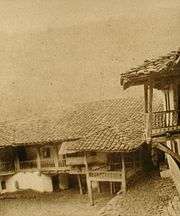Radoslav Hlapen
Radoslav Hlapen (Serbian: Радослав Хлапен; fl. 1350–1383) was a Serbian magnate who served Serbian Emperor Stefan Dušan (r. 1331–1355) and Stefan Uroš V (r. 1355–71) as vojvoda (military commander). He took part in the conquest of Byzantine lands, and was given a region north of Thessaly to govern in the early 1350s.
Radoslav Hlapen | |
|---|---|
| Serbian imperial magnate | |
| Titles and styles | |
| Born | early 14th century Serbian Kingdom |
| Died | between 1383 and 1385 Serbian Empire |
| Noble family | Hlapenović |
| Spouse | Irina |
| Issue | |
Origin
It is believed that Radoslav Hlapen is the same person as župan (count) Hlapen (Latin: Clapen) who governed Konavle and the wider Trebinje region in the 1330s.[2] He was possibly the son of župan Radoslav,[2] and thus named Radoslav after his father.[3] Another theory is that he was the son of Syrgiannes Palaiologos.[4]
Byzantine Emperor John VI Kantakouzenos (r. 1347–54) mentioned him as among the most important nobles, and he was called a relative of Dušan.
Service under Stefan Dušan
Serres was captured in September 1345, Veria in the first half of 1346.[5] Veria and the surrounding towns were recuperated by John VI Kantakuzenos.[5] After the military conquests, perhaps by spring 1351, Hlapen returned the city to Serbian rule, with many cities and towns in the area.[6] He was appointed governor of Edessa (Voden) and Veria (Ber), just north of Thessaly.[7]
Emperor Dušan died in Devol, on 20 December 1355. Dušan was succeeded by his son Stefan Uroš V.
Service under Stefan Uroš V
After the death of the governor of Thessaly kesar Preljub (1356), Preljub's son Thomas' claim to the region was asserted by the widow Irene. The Preljubović family was forced to flee to Serbia after the advance of Nikephoros II Orsini in 1356. Irene married Radoslav Hlapen, who adopted Thomas.
Despot Simeon Uroš, the brother of Dušan, was appointed governor of Epirus and Acarnania in 1348. Following the death of Dušan and subsequent invasion of Nikephoros II, Simeon Uroš retreated to Kastoria, where he proclaimed himself "Emperor of Serbs, Greeks and Albanians". Simeon Uroš acquired the support of John Komnenos Asen (the brother-in-law of Dušan). In response, the Serbian nobility held a council in April 1357 at Skopje, in which they vowed to support Emperor Uroš, according to Dušan's will. In the summer of 1358, Simeon Uroš advanced on Zeta but was stopped at Skadar, where his army of 5,000 men was defeated by the Serbian nobility. Simeon Uroš returned to Kastoria, and never again tried to acquire Serbia. During the absence of Simeon Uroš in Epirus (1359), Hlapen invaded Thessaly on behalf of his stepson Thomas. Simeon Uroš was forced to cut his losses by recognizing Radoslav Hlapen's conquests, turning over Kastoria to him, and marrying his daughter Maria to Thomas. Hlapen continued to recognize Uroš' suzerainty, and provided a buffer between Uroš V and Simeon Uroš. After the treaty between Hlapen and Simeon Uroš, the latter settled in Thessaly.[8]

In 1365, a čelnik Radoslav was mentioned, referring either to Radoslav Hlapen or Radoslav Povika, the brother of logotet Đurađ.[1]
Fall of the Serbian Empire
After the Battle of Maritsa (1371) he became one of the most powerful provincial lords.
Last years
He retired as a monk in the Vodoča monastery where he also was buried. His votive ring was found at the site.[9] He also founded a church in Kučevište, Skopje,[9] a monastery in Ostrovo,[10] and a monastery in Greece.
Family
He married Irina (Irene), the widow of caesar Preljub. They had the following issue:
- Maria Angelina Radoslava, married Alexios Angelos Philanthropenos
- Jelena, married Prince Marko
- Unnamed, married Nikola Bagaš
- Unnamed, married John Uroš[1]
- Stefan
Legacy
Mavro Orbini (1563–1614) called him "primo barone di Grecia" (1601).
See also
- Nobility of the Serbian Empire
References
- Evans 1989, p. 9.
- Blagojević 1997, p. 47.
- Blagojević 1997, p. 48.
- Evans 1989, p. 16.
- Maksimović 2004.
- Византолошки институт 1987, p. 155.
- Fine 1994, pp. 347.
- Fine 1994, pp. 347–50.
- Mihajlovski 2005.
- Srpska akademija nauka i umetnosti (1937). Društveni i istoriski spisi. 49. p. 69.
Sources
- Books
- Blagojević, Miloš (1997). Državna uprava u srpskim srednjovekovnim zemljama. Službeni list SRJ.CS1 maint: ref=harv (link)
- Ćorović, Vladimir (2001), Istorija srpskog naroda (in Serbian) (Internet ed.), Belgrade: Ars LibriCS1 maint: ref=harv (link)
- Evans, Charles F. H. (1989). Studies in Genealogy and Family History in Tribute to Charles Evans on the Occasion of His Eightieth Birthday. Association for the Promotion of Scholarship in Genealogy.CS1 maint: ref=harv (link)
- Fajfrić, Željko (2000) [1998], Sveta loza Stefana Nemanje (in Serbian), Belgrade: "Tehnologije, izdavastvo, agencija Janus", "Rastko".CS1 maint: ref=harv (link)
- Божидар Ферјанчић (1974). Тесалија у XIII и XIV веку. Византолошки институт САНУ.
Овде се Прел>убова удо- ннца удала за Радослава Хлапена, господара Вера, који је сматрао да му после погибије деспота Нићифора II Анђела такође припада право на Тесалију. Зато се Радослав Хлапен 1359/60. године ...
- Fine, John Van Antwerp (1994). The Late Medieval Balkans: A Critical Survey from the Late Twelfth Century to the Ottoman Conquest. University of Michigan Press. ISBN 978-0-472-08260-5.CS1 maint: ref=harv (link)
- Nicol, Donald MacGillivray (1993), The Last Centuries of Byzantium, 1261–1453, Cambridge University Press, ISBN 978-0-521-43991-6
- Soulis, George Christos (1984), The Serbs and Byzantium during the reign of Tsar Stephen Dušan (1331–1355) and his successors, Dumbarton Oaks, ISBN 0-88402-137-8
- Journals
- Mihajlovski, Robert (2005). "The Votive Ring of Radoslav Hlapen". Byzantinoslavica. Academia. 63: 187–192.CS1 maint: ref=harv (link)
- Византолошки институт (1987). "Зборник радова Византолошког института". 26-28. Научно дело. Cite journal requires
|journal=(help)CS1 maint: ref=harv (link) - Maksimović, Ljubomir M. (2004). "Berroia in Stefan Dušan's politics". Зборник радова Византолошког института. 41: 341–352.CS1 maint: ref=harv (link)
